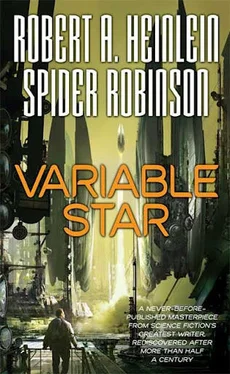Zog even managed—don’t ask me how—to make the ever-present mortal danger of fire we would face and even the threat of Hungry Ghosts seem like only bedtime-story monsters, thrilling but not truly terrifying. I think if you took a poll, most people would agree with me that Bravo Colony’s history as a real rather than merely potential entity begins with the moment Kamal Zogby began to speak that night. Before that we were a big can full of smelly strangers. When he was done we knew that we were a family, and one that was going to create an entire world from scratch together one day, in an environment strikingly like the one in which humans had first evolved back on Terra, and that it was going to be an adventure. Everything we did would be legend for ten thousand years: the first legends of our planet.
There were a couple of obligatory anticlimax speeches and announcements, and then Merril closed the meeting precisely when she had said she was going to, at 2300 Sheffield time.
Ship’s time, that is. By that point in our voyage, six months out, we were already beginning to use Dr. Einstein’s Clock instead of Sol. Lorentz contraction had set in, and we were aging just measurably slower than the people we had left behind.
How much slower? Not a lot—yet. At the instant when those of us in the Sheffield passed the six-month mark of the trip, residents of the Solar System were only about seventeen and a half hours older than we were.
But it would get steadily worse as our velocity mounted up. And constant boost mounts up fast .
At the one-year mark, the differential would be about seven days and seven hours.
At two years, it would be more than fifty-eight days.
By the five-year mark, the divergence of our clocks and mankind’s would surge up to almost three years. We would be traveling at more than 0.938 c .
And when I had been traveling for ten years, and was twenty-eight years old, more than forty-five years would have elapsed on Terra. Behind me Jinny would be closing in on sixty-four.
And receding at 99.794 percent of the speed of light.
Then we would flip over and do the whole thing in reverse. And assuming we got it right, and made orbit around Brasil Novo as planned, we Peekaboobs would be twenty years older, and Solarians would be something like eighty-five years older. Jinny would be one hundred and eight, and probably wouldn’t look a day over eighty.
Time has always struck me as one of the Allegedly Intelligent Designer’s ideas that was never properly beta-tested before its implementation.
I know: they say it serves to keep everything from happening at once. But what would be so bad about that? You’d get to see both the Big Bang, if there really was one, and the Heat Death, if there’s going to be one. Either way at either end, you’d know . That and everything else knowable. You’d have what Adam and Eve got cheated out of, what they thought they were bargaining for. Gnosis.
So would everybody. No more bullshit.
Okay, so it would lack suspense. But it wouldn’t lack surprise. Everything would be a total surprise, always.
I have a great career ahead as a consultant in the thriving field of universe design, Sol once told me. I told him he should hire me: some experts said he and his fellow Relativists generated mini-universes like soap bubbles every working day. He said the moment he got a complaint from one of them, I was the guy he would hire to do the renovation.
I don’t care what Dr. Einstein says: my own clock seemed to speed up as the days went by. Those first few hours after leaving orbit took forever to pass. The first few days went by at a glacial pace. Then for weeks, every minute of every day brought new information, new people, new situations, new problems, new mistakes, new things to learn and unlearn. After a few months, of course, it began to slack off. At six months, I had a fair idea of where to find most of the good stuff and how to avoid most of the bad stuff, and the days started to slide by while I wasn’t paying close attention, and events began to sort of lurch forward in quanta rather than unfold in a smooth flow.
Things did move forward, though. By the end of the first year, I was on my sixth girlfriend of the voyage.
I’ve already mentioned the first one, twice, but you probably didn’t notice her go by. Robin Feeney was the female lead in the Doc Simon play I took Kathy to see, on our first and last date—the actress whose performance I was championing just before everything went to hell. When Robin spoke up at that first Town Meeting, in support of the shorthand name Bravo, I was just out of frame beside her, holding her hand and smiling encouragingly. I’m the one who said “Bravo!” first when she was done. It got me soundly kissed about two minutes after the meeting ended.
And that, I’m sorry to admit, is very damn nearly all there is to say about that relationship. That kiss may have been the high point.
If my life were a play Robin would have had to be a pivotal character, vivid and vibrant, the source of several life-changing insights, and utterer of at least one or two lines that would come back to haunt me in the third act. It was a role she was perfectly cast for, too, one she could play the hell out of. Unfortunately she had no one to write it for her—and no skill at improv. Onstage, she was vivid and vibrant. Offstage, she was usually thinking about how to be thought vivid and vibrant the next time she was onstage.
I sound like I’m implying that she was more self-centered than I, which is both unfair and untrue. In all honesty, Robin’s principal attraction for me was that she was a female mammal with a body temperature of thirty-seven degrees who was willing to share my company in a social context. I certainly didn’t think of it in those terms then, of course, but looking back on it I can see the most powerful emotion I felt throughout was probably relief at finally being able to get Dr. Amy off my case.
We couldn’t even manage a meet-cute. She came up to me after a set at the Horn, to ask the name of the piece Kathy and I had just played. “Shaping the Curve,” it was: a soprano-piano duet by a twenty-first-century composer named Colin MacDonald. I said if she gave me her address I would mail her MacDonald’s own recording, and I did, and after a couple of days of increasingly chatty mail we finally made a date. That was all there was to it.
Herb says a relationship that begins without a good anecdote has no future. He may be right. Jinny and I met online at the campus bookstore, the first week of class. She asked if I had a battery wafer she could borrow, and I did. Yawn. And look how that turned out.
For our first date Robin and I picked a common choice: we shared Sim. And once there, the simulation we agreed on was again one of the most common options: background sharing. I showed her typical scenes of life on Ganymede, some of the places and activities that had once mattered to me. She walked me through comparable scenes of life in The Wheel, one of the smaller O’Neills, where she had been born. In my opinion it’s also one of the goofier ones, an odd combination of mystical and uptight. They believe in the anthropic principle, and live communally and take entheogens, but nobody ever leaves a surface unpolished or an item out of place. I didn’t express this opinion, and in return Robin was far too polite to tell me that Ganymede struck her as materialistic and sloppy. Our truth level never did improve much.
I did notice that she was a different person when we were in The (simulated) Wheel, one I think I maybe would have liked better. But she didn’t.
If I want to, or need to, I can reach back into my mental file storage and pull out long stretches of footage representing just about all the major periods and significant people of my life—usually in ultradefinition video with supersaturated color, and full spectrum audio with enhanced treble and bass. In the drawers marked “Dad” and “Jinny” there are extended sequences in true 3-D, complete with textured smells, and sometimes even tastes. Sadly such mental files are like analog recordings rather than digital, in that they decay slightly with each playback. At the same time, paradoxically, some of the earliest memories are the most detailed and evocative.
Читать дальше










